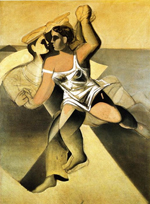
"The Life You Save May Be Your Own"
"Mr. Shiftlet felt that the rottenness of the world was about to engulf him" (183).
Flannery O'Connor's "The Life You Save May Be Your Own" (1953)
Points
for Reflection
Flannery O'Connor's "The Life You Save May Be Your Own" (1953), 172-83
- why is "the old woman" unafraid of Mr. Shiftlet immediately after seeing him for the first time (172)?
- what array of disabilities does Lucynell appear to have, and what one actual disability later explains the misleading appearance of the others?
- when Mr. Shiftlet says "there's some men that some things mean more to them than money" (175), he's obliquely referring to what? What is his mind set on, from the moment he plops down on the old woman's front porch?
- is Lucynell's "innocence," which makes it difficult to determine her age (178), primarily a function of her disability, her domestic situation, or her rural environment?
- why does O'Connor's narrator use the word "ugly" to describe the old woman's claim that "'there ain't any place in the world for a poor disabled friendless drifting man'" (179), and should the reader--upon finishing the story--consider the old woman "uglier" in spirit than Mr. Shiftlet?
- Mr. Shiftlet's deception is indisputable, but is he as much of a liar as the Bible salesman in the last story we read? Does he speak truth as well?
- Mr. Shiftlet, like Enoch in Wise Blood, is very interested in the mysterious function of the heart (174) and blood (180). What symbolic function do these variables serve in this story?
- why does Mr. Shiftlet's depression, a result of the civil marraige ceremony (180), deepen even after he has achieved his endgame (182)?
- why did O'connor choose the title she did for this short story (182)?
- by the story's end, is Mr. Shiftlet justified in crying out to God for His intervention in the moral morass that is the human situation?

Venus and Sailor (1925)
oil on canvas
Salvador Dalí
Dr. Paul Marchbanks
pmarchba@calpoly.edu
![]()
